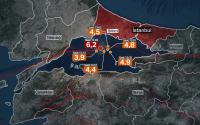9 February 2007Mark Hertsgaard
There is implicit good news in the mostly bad news in the latest big global warming report: From now on, politicians will find it harder to do little or nothing to fight this problem. The release of the report on February 2 by the world's leading scientific body on global warming, the Intergovernmental Panel on Climate Change (IPCC), ranks as a landmark development. Using unusually blunt language for a scientific document, the report describes global warming as "unequivocal" and says it is "very likely" caused by humans. The results, according to the report, will likely include more frequent heat waves and stronger droughts and storms, while sea levels will continue to rise for more than a thousand years. The silver lining is that such plain-spoken warnings should make it difficult for anyone to argue that greenhouse gas emissions should not be reduced. Capitol Hill already had been aflutter with prospective global warming bills; the report makes it more likely that one will land on George W. Bush's desk by year's end. Bush will face a choice: Sign the bill despite the presumed opposition of the oil and coal interests he has championed, or veto it and leave fellow Republicans open to attack on what's shaping up as a top-tier issue in the 2008 elections.
As for the bad news in the report, it confirms that the battle to prevent global warming has been lost. Now the race to survive it has begun. Because we waited so long to act, the best humanity can do now is slow global warming down to where we can hope to endure it with relatively manageable damages. How bad things eventually get will depend on how much greenhouse emissions are cut, and how quickly. But the momentum of the climate system--the fact that carbon dioxide remains in the atmosphere for decades, and oceans store heat for centuries--guarantees that global warming will get worse before it gets better (unless someone invents a miracle technology to strip existing carbon dioxide from the atmosphere).
Even if humanity stopped all greenhouse gas emissions today, the IPCC notes, global temperatures would still rise 1.1 degrees Fahrenheit by the year 2100. An immediate stop is impossible; it would mean shutting off every electric power plant, automobile, furnace and other device anywhere in the world that runs on oil, coal or natural gas, as well as halting tropical rainforest destruction. Thus the IPCC calculates a range of possible future temperature increases that vary by how quickly emissions are or are not reduced. At the very least, says the report, temperatures will rise 2.0 degrees Fahrenheit by 2100, assuming a rapid shift away from fossil fuels. More likely is an increase of 3.2 to 7.2 degrees.
These numbers imply that there is very little time for humanity to avoid passing a climate threshold known as the two-degree target. Endorsed by the European Union and many top scientists as the maximum amount of warming above pre-industrial-era levels that humanity can tolerate before damages become unmanageable, the target can be confusing to Americans because it refers to two degrees Celsius. The equivalent in Fahrenheit is 3.6 degrees. At first glance, that sounds roomy enough. After all, the IPCC estimates that "likely" future temperature rise will range between 3.2 and 7.2 degrees Fahrenheit; thus if we decarbonize our economies fast enough to hit the low end of that range, the threshold could be avoided. The problem is, humanity's past greenhouse emissions have already caused the temperature to rise 1.1 degrees Fahrenheit over the last century. That means we will pass the threshold if we raise the temperature by only 2.5 degrees--barely more than the lowest amount the IPCC considers feasible. And even in that case, we will still face considerable sea-level rise and more killer heat waves, droughts and hurricanes.
There are no good answers to global warming, only degrees of bad. But speedy action might let us avoid the most catastrophic scenarios. Scientists say we must cut emissions 80 percent by 2050, which is what the Global Warming Pollution Reduction Act, sponsored by Bernie Sanders, Barbara Boxer and others, mandates. Habitual foot-draggers ExxonMobil and the Bush Administration look almost comical as they reposition themselves for the battle to come. Bush uttered the words "global climate change" in a State of the Union address for the first time last month; ExxonMobil announced it would stop funding some climate-change deniers. But neither the White House nor the oil giant accepts mandatory limits on greenhouse emissions. They simply recognize that Congress is going to pass a bill this year, and they know that in Washington if you don't have a seat at the table, you're on the menu. Defenders of the status quo will want a bill that sounds good but does little except defuse pressure for real change. And that would be the worst outcome of all.






